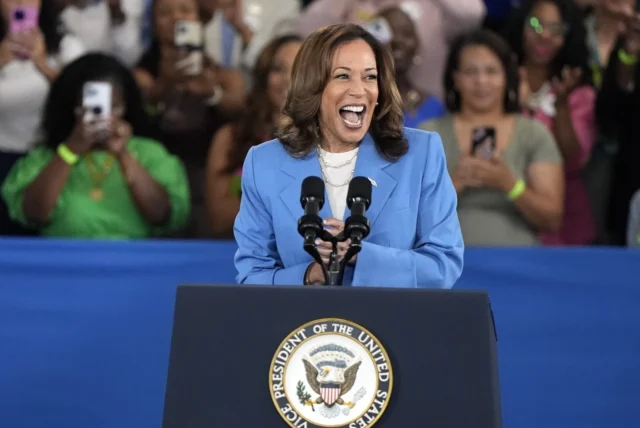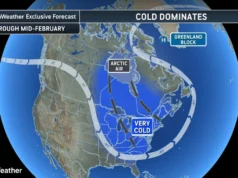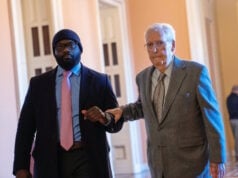
RALEIGH, N.C. (AP) — Vice President Kamala Harris announced a sweeping set of economic proposals on Friday meant to cut taxes and lower the cost of groceries, housing and other essentials for many Americans.
“Look, the bills add up,” she declared, trying to address the financial concerns that are at the top of voters’ minds and that Republican Donald Trump is attempting to blame on her.
During a speech in the battleground state of North Carolina, Harris said that “building up the middle class will be a defining goal of my presidency” as she promoted her plan for a federal ban on price gouging by food producers and grocers. She also proposed $25,000 in down payment assistance for certain first-time homebuyers and tax incentives for builders of starter homes.
“Every day across our nation, families talk about their plans for the future, their ambitions, their aspirations for themselves, for their children. And they talk about how they’re going to be able to actually achieve them financially, because, look, the bills add up,” Harris said. “Food, rent, gas, back to school clothes, prescription medications. After all that, for many families, there’s not much left at the end of the month.”
Overall, the plans represent a continuation of many Biden administration priorities.
Harris isn’t looking for any radical departures from President Joe Biden, who stepped down from the race last month and endorsed her. Still, the vice president has embraced a dash of economic populism, shifting away from Biden’s emphasis on job creation and infrastructure to matters more closely tied to easing the cost of living -– food prices, housing costs and tax breaks for families.
The vice president is seeking to blunt Trump’s attacks on her. He responded to her speech by posting on his social media account, “Kamala will implement SOVIET style price controls.” He gave his own speech Thursday, during which he displayed popular grocery store items meant to represent the high cost of food.
Some of Trump’s economic advisers offered further rebuttals to Harris’ plans before she spoke on Friday, with Brian Hughes, a spokesman for the former president’s campaign, calling them representative of a “socialist and authoritarian model.”
Kevin Hassett, a former chairman of the Council of Economic Advisers during the Trump administration, called it “completely preposterous” for the government to play a role in setting food prices, a reference to Harris’ proposed federal ban on “corporate price-gouging” on food.
“It will mean higher prices on just about every one of your daily needs,” Harris said. “A Trump tax on gas, a Trump tax on food, a Trump tax on clothing, a Trump tax on over-the-counter medication.”
She added, “At this moment, when everyday prices are too high, he will make them even higher.”
Year-over-year inflation has reached its lowest level in more than three years, but food prices are still 21% above where they were three years ago. A Labor Department report this week showed that nearly all of July’s inflation reflected higher rental prices and other housing costs, a trend that, according to real-time data, is easing. As a result, housing costs should rise more slowly in the coming months, contributing to lower inflation.
Monica Wallace, a county clerk who attended Harris’ speech, called the vice president’s economic plans “what we need.”
“I have a mother who is receiving services, and just in food stamps alone, she’s still not able to afford food that will last her,” Wallace said.
Comparing Harris to Trump, Wallace said she sees the vice president as someone “definitely for the middle and lower class,” whereas the former president is “for the people who make the money to do any and everything that they want.”
Riding a resurgence of enthusiasm since the Democrats’ campaign reboot, Harris has embarked on a battleground state blitz in recent weeks that has broadened the number of races viewed as competitive by strategists. In North Carolina, Democrats are navigating renewed energy with caution in an economically dynamic state that hasn’t been won by a Democratic presidential candidate since Barack Obama in 2008.
Gov. Roy Cooper told Friday’s crowd, “I have that 2008 feeling.”
“That’s the last time we voted for a Democratic nominee for president, Barack Obama,” Cooper said.
North Carolina State University political science professor Steven Greene said that the state “went from a situation where Joe Biden was almost surely going down in defeat here, whereas Kamala Harris has a very real chance of winning,”
Deborah Holder, a 68-year-old Raleigh resident who runs six McDonalds restaurants, said of the vice president, “Her culture is something that is going to be a huge strength for her, because she’ll be able to look at the rest of us not just as her constituents, but as people that she has dealt with in all walks of life,”
Harris is trying to strike a balance in defining her own image and economic agenda while still giving credit for the Biden administration’s track record. Her speech in North Carolina came a day after the president was asked if Harris might distance herself from his economic record and responded, “She’s not going to.”
In their first joint speaking event since Biden dropped out, he and Harris were in Maryland on Thursday where they showcased successful negotiations to lower prices for Medicare recipients on 10 prescription drugs.
But Harris spent far more time talking about Trump than Biden in North Carolina, promising “to build an America where everyone’s work is rewarded and talents are valued, where we work with labor and business to strengthen the American economy.”
“And where everyone has the opportunity,” she said “not just to get by, but to get ahead.”
__
Associated Press writers Meg Kinnard in Chapin, South Carolina, and Will Weissert in Washington contributed to this report.
Disclaimer
The information contained in South Florida Reporter is for general information purposes only.
The South Florida Reporter assumes no responsibility for errors or omissions in the contents of the Service.
In no event shall the South Florida Reporter be liable for any special, direct, indirect, consequential, or incidental damages or any damages whatsoever, whether in an action of contract, negligence or other tort, arising out of or in connection with the use of the Service or the contents of the Service.
The Company reserves the right to make additions, deletions, or modifications to the contents of the Service at any time without prior notice.
The Company does not warrant that the Service is free of viruses or other harmful components












